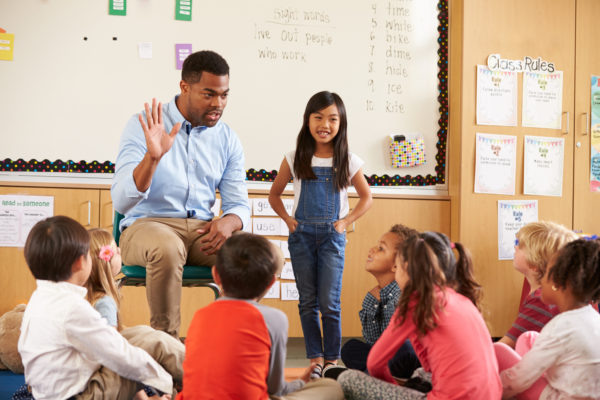[Editor’s note: This story is Part 2 of our 3-part series on Lessons Learned in 2016. Check back tomorrow for Lessons Learned by Educators. Click here for yesterday’s article from Superintendents.]
The best educational leaders are lifelong learners. They are constantly expanding their knowledge, refining their skills, and looking for creative ways to help kids learn. As these four principals look back at 2016, they recall the most important ed tech lesson they learned this year—and look forward to inspiring their staff and students anew in 2017.

Technology Usage Lowers Discipline Referrals
Based upon my district’s 7 Keys to College and Career Success, E.A. Cox Middle School has embarked on a transformational journey to turn around the school. Through the Leader in Me and an RTI2-B partnership with Vanderbilt University, the school is transforming its culture and addressing unrealistically high behavioral issues that inhibit learning. Attendance has improved and discipline referrals have decreased.
As part of the process, E.A. Cox Middle School focused on literacy, math, and lowering discipline referrals, which adds a social-emotional learning aspect to our plan. With myON, more than 12,000 books have been read and students have spent more than 4,000 hours reading. Lexile levels are climbing, and students are more engaged and motivated to read more now than ever.
Through DreamBox, more than 33,000 math lessons have been completed with a 29% growth among active students. One-third of the students are enrolled in advanced math and English. Student engagement is high. Parent and community support are strong. But this is only the beginning. Problem-based learning through Discovery Education and NextLesson are changing the way students learn and teachers teach at Cox Middle and across the district. —Dr. Tim Webb, principal of E.A. Cox Middle School in the Maury County School District (TN)

Every Student Deserves a Voice
Looking back on 2016, one lesson shouts as the loudest of them all: the power of the human voice. Whether it is students negotiating the details of collaborative projects or debating the merit of Skittles versus Hershey’s in our candy bar election, or teachers posing a thought-provoking query and reassuring their students that we are all here together to build a better world, it is the human voice that reigns king.
As a principal, I search for tools that give voice to everyone on campus. We have talking devices for nonverbal students, word prediction software for learning-disabled students, and a megaphone for staff to yell “1-2-3 Go Mountain View” every morning. Adding to our collection, this year we’ve added classroom audio systems by Lightspeed Technologies. The systems allow educators’ voices to cut through the noise of a traditional classroom to increase student engagement and behavior, and give soft-spoken students a chance to be heard among their peers.
Lessons are at the heart of each and every day for educators. We imagine lessons, develop lessons, and deliver lessons for our students. Through Twitter chats, book studies, conferences, and more, we as educators devour lessons of our own. Embracing the power of the human voice and giving everyone an equal opportunity to be heard was my greatest lesson this year. —Jennifer Goldman, principal of Mountain View Elementary in the Simi Valley School District (CA)
(Next page: Principals’ lessons learned 3-4)

Real-world, Project-based Lessons Inspire Creativity
Every year is a learning experience for our students and a time for reflection for our teachers as well, and 2016 was no exception. The biggest lesson I have learned this year is that our students thrive when engaging in project-based learning. They embrace creativity and are inspired to investigate new careers in a much more frequent manner than we have seen before at the middle school level.
Using the Defined STEM framework, our students are able to put their knowledge to the test and show what they’ve learned using real-world examples. In 2017, I plan on having more professionals on hand for our students to talk to after their exposure to STEM activities, so they can have real conversations about careers they are interested in and may potentially pursue! —Shandon Tweedy, Assistant Principal at Horace Mann Middle School in Kanawha County Schools (WV)

Technology Connects Students Across the Globe
The biggest lesson we learned at Annunciation Day School in 2016 is that technology helps us to experience the world in a deeper way, and the Promethean ActivBoards in our classrooms make this possible. For example, this week our seventh-grade students used Promethean ActivPanels in social studies to virtually fly to Cairo, Egypt, using Google Earth. Students were so excited to be able to zoom in on the main airport in Cairo where they saw the pilot training center. Students also explored the city from above and even found a Pizza Hut where they can stop for lunch if they get the opportunity to visit Cairo in the future.
Earlier this month, another seventh-grade class connected online to the Uganda Project through the ActivWall. This project provides education for 200 children who are cared for at the center, and also supplies their basic needs including housing, meals, clean water, clothing, and school supplies. Our students watched a video of Ugandan students who are involved in this project perform cultural dances and music. When they saw their peers in Uganda learning in a more disadvantaged and less sanitary environment, it initiated meaningful conversations about cultural differences in clothing, food, and education. The use of the ActivWall allows our students to see parts of the world in a bigger way and creates interesting discussions. We look forward to many more journeys to other parts of the world as we enter 2017! —Peter Epstein, Principal of Annunciation Day School in Atlanta, GA
- 4 ways to encourage play in education - April 25, 2024
- CoSN IT Leader Spotlight: Lisa Higgins - April 25, 2024
- It’s time to pay student teachers - April 25, 2024


